Are you considering the deeper intent behind each of your target keywords?
Implementing an intent-based strategy for your SEO and content efforts could be the change you need to set your website apart from the competition.
To build your strategy around intent, you’ll need to start with keyword research that takes into account the different types of keywords.
So, what are the different types of keywords?
Most SEOs commonly agree that there are four main types of keywords to classify intent:
Informational keywords — searchers looking for an answer to a specific question or general information. Navigational keywords — searchers intending to find a specific site or page. Commercial keywords — searchers looking to investigate brands or services. Transactional keywords — searchers intending to complete an action or purchase.The intent type assigned to a keyword can tell you if a searcher is looking to buy something soon, shop around, or gather information.
On Semrush it’s easy to see any keyword’s intent value when researching keywords or domains in our database.
All you have to do is look for the intent column or filter in any report, just like you would filter for volume or CPC.
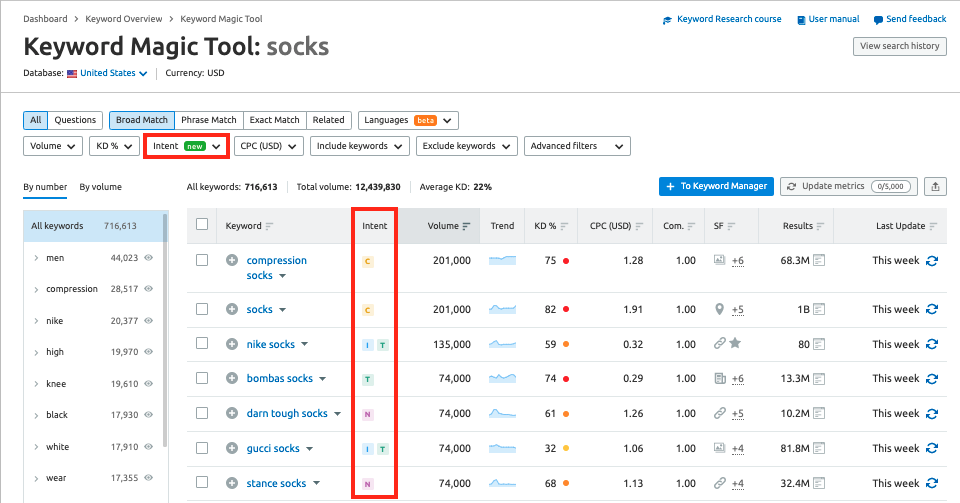
In addition, you can look up a competitor ( Domain Overview or Organic Research) and see the ratio of keyword intent types making up their keyword portfolio:
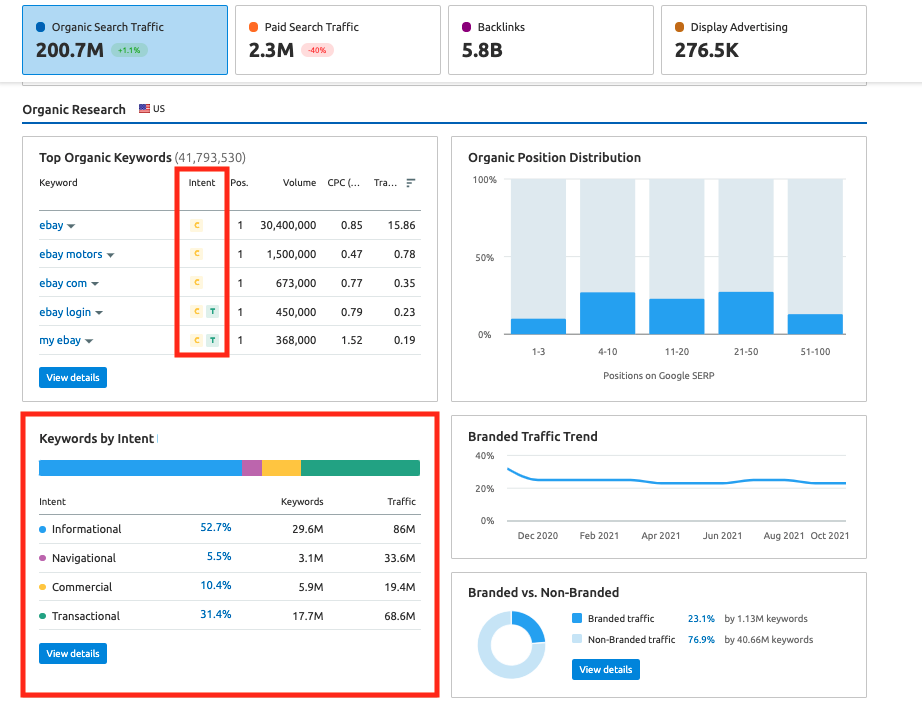
Four Types of Keywords
When researching to discover a user’s intentions behind making a search, we can classify all keywords into four main categories of intent: commercial, transactional, informational, and navigational.
We're going to identify what these types are with a short breakdown of each type.
Informational
There are plenty of keywords with significant search volume that don’t bring website conversions. Why?
People are simply searching for information. We call these searches informational keywords.
Informational keyword examples:
coffee calories national coffee day difference between cold brew and iced coffee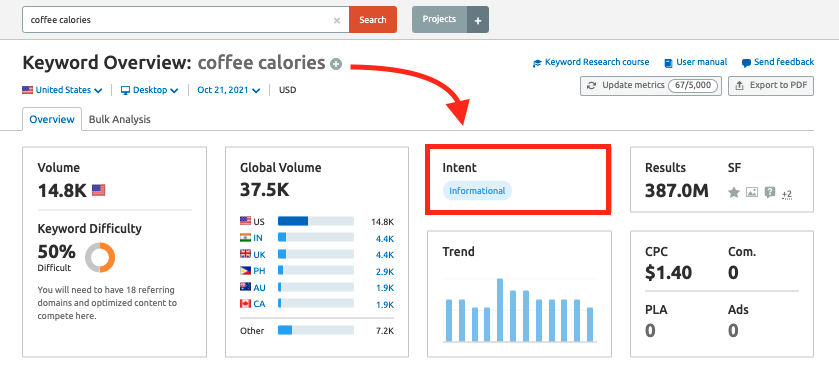
You can distinguish this type of keyword by “question words” as they usually contain clues like “what is,” “how,” and so on.
Google’s results pages for informational searches also commonly contain knowledge panels, carousels, or infoboxes to provide quick answers when applicable.
These keywords carry less intent to take real action when compared to transactional or commercial keywords.
However, they can be valuable in building brand awareness by targeting them with informational content and educating your audience.
By targeting these terms, your website could become an authority in your niche and trusted by those searching for help or common questions.
Navigational
Another type of keyword to be aware of is navigational.
When someone types in a company or brand name into a search engine, they perform a navigational search.
Navigational keyword examples:
Youtube Semrush blog Where is angelinos coffee located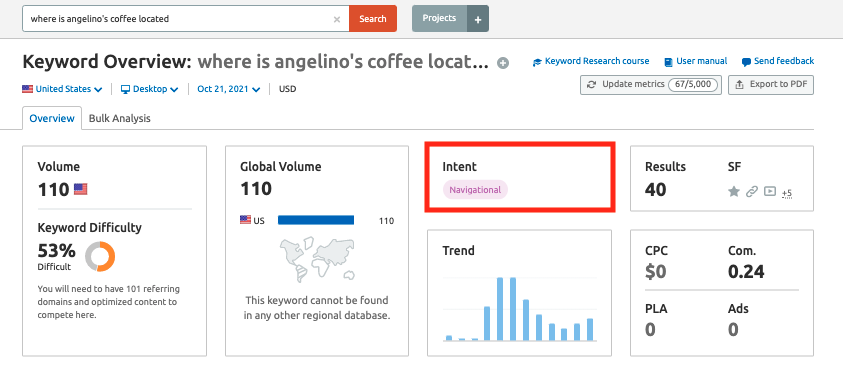
People behind these searches already know the company or product and want to find the correct website or physical location to get to their products.
Such keywords can be helpful sources of organic traffic when the brand or the site are well-known and popular.
Commercial
Commercial keywords are keywords that reveal a searcher’s interest around specific products or services.
These searches can occur when a person wants to know more about a particular product or service — they may want to support their idea of purchasing, compare the product to similar products or look for free offers/tests/discounts.
You can target these keywords with comparison articles, listicles, reviews or how-to articles depending on the specific keyword.
Commercial keyword examples:
Free coffee Dunkin iced coffee flavors Ipad vs ipad air Ipad mini reviewsBecause these keywords reveal a person’s intention to buy or take some form of commercial activity in the future, these keywords can be valuable opportunities to reach an audience that could be converted into future customers.
Transactional
The keywords with the strongest intent to buy or take imminent action are transactional keywords.
These keywords can be targeted with paid ads and highly optimized purchase pages or pages where users can take immediate action on a site.
Transactional keyword examples:
Buy crypto online Sandwich places near me that deliver Pickup truck for sale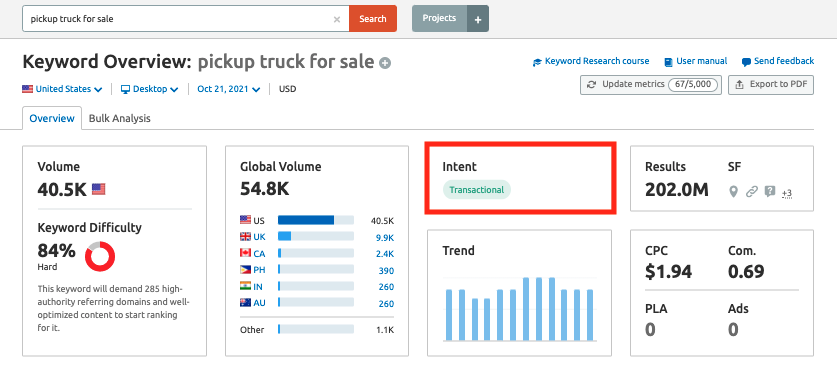
These searches can happen after someone has already searched for information, made a decision, and is determined to now take a specific action or make a purchase.
Such keywords often feature words like “buy,” “subscribe,” “for sale.” Therefore, the SERP of a transactional keyword often has Google Shopping ads.
Transactional keywords can also be referred to as buyer keywords because they are most likely to be used by a person at the bottom of the buying funnel. Therefore, these keywords are highly valuable when making keyword research and planning an SEO or PPC strategy.
As a rule, these keywords could be more specific as well, describing a product or service more precisely (“neon blue unisex watch,” for example).
How Semrush Calculates Keyword Intent
To give each keyword an intent type, Semrush looks into a few factors:
SERP features present in keyword search results. The presence of words in the keyword that indicate the intention of the user (for example: buy, address, how). If the keyword is branded or not branded.Please note: A keyword can have more than one intent. This will be reflected in the tool by listing both applicable intents next to the keyword, as seen below:

For more information on how we calculate this metric, check out this blog post.
How to Discover Keyword Intent with Semrush
To research keywords by intent on Semrush, all you have to do is look for the intent column in any keyword-related report.
As of November 2021, you can instantly see the intent value for any keyword in the Semrush database.
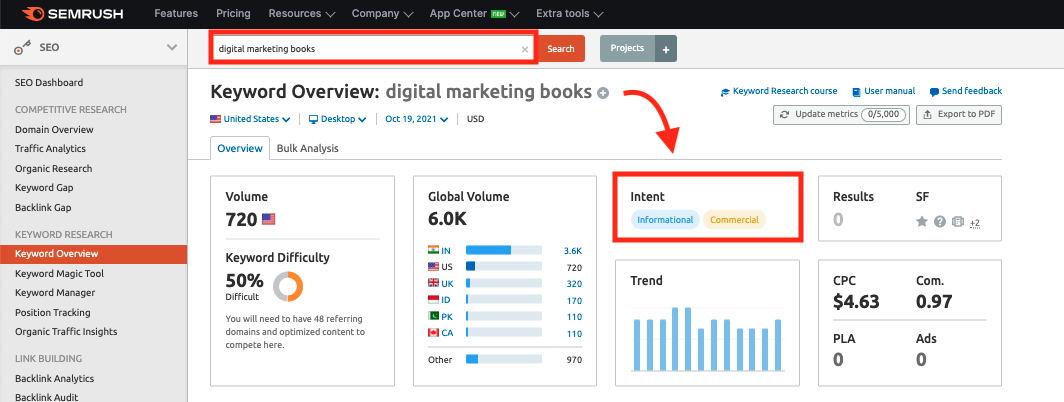 T = Transactional C = Commercial I = Informational N = Navigational
T = Transactional C = Commercial I = Informational N = NavigationalHow can you use Semrush reports to find high intent keywords?
Here’s a couple of quick ways:
1. Check the intent of any keyword or list of target keywords
Go to the Keyword Overview and enter a list of up to 100 target keywords at a time into the input field and hit Analyze.
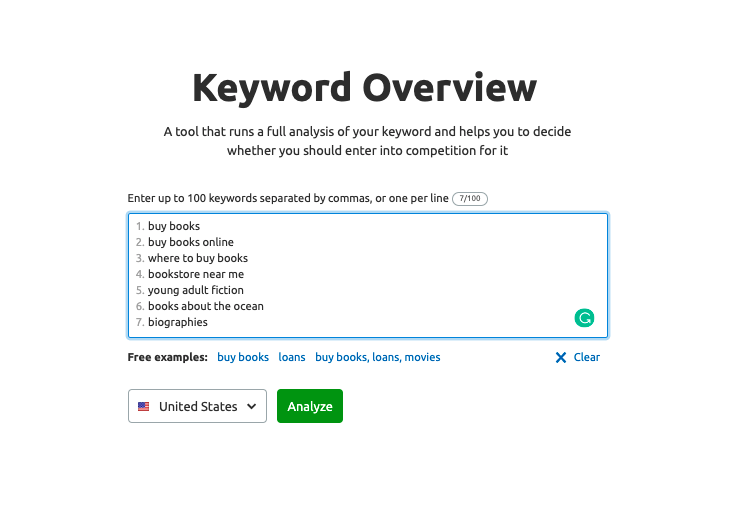
Now you can see the intent label for your full list of keywords.
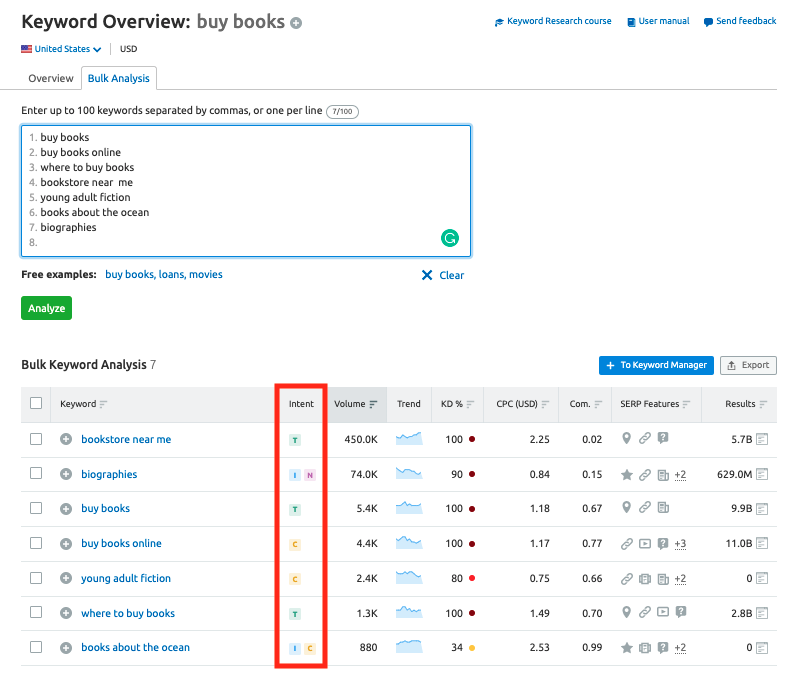
You can now download this list with intent labeled on each of your keywords with the export function, or send the list to Keyword Manager to save your research on the platform.
2. Analyze a competitor’s keyword intent profile
Go to Domain Overview, enter a competitor’s domain name and look for the Organic Search Traffic widget.
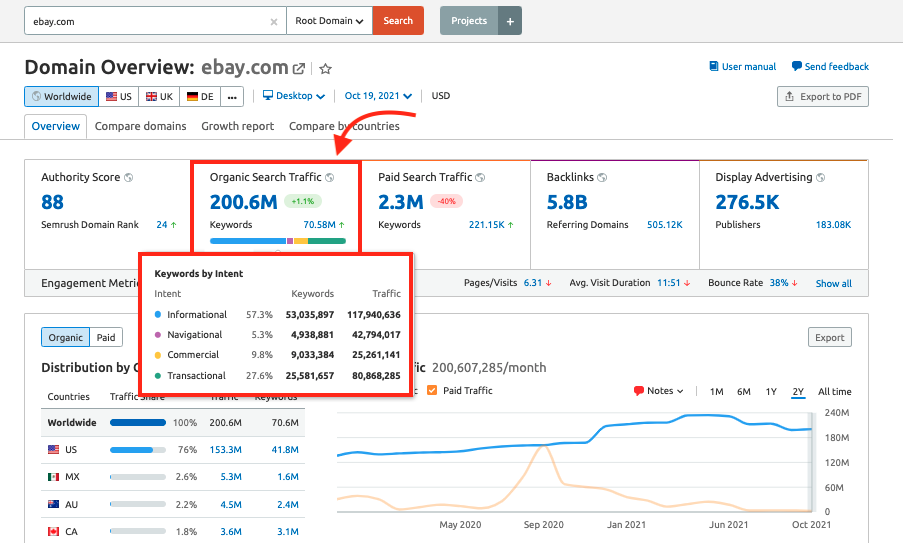
Click on the bold blue number in this widget and you’ll jump to the Organic Research Positions report. That report can show you the complete list of their keywords, where you can filter by each type of intent.
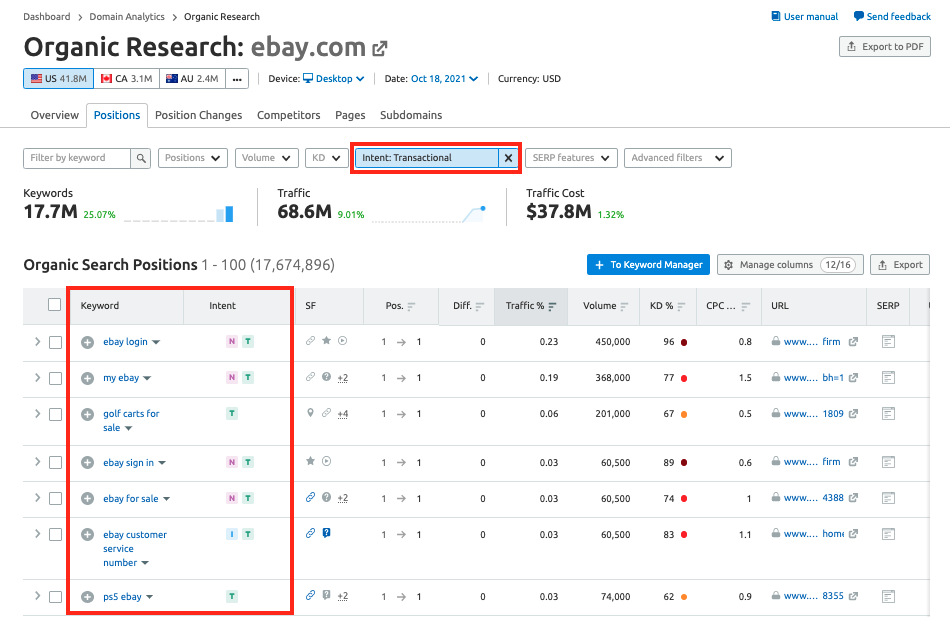
Filter by intent type to discover what informational keywords bring them the most traffic or how many transactional keywords they have high rankings for.
Next, you can inspect their top pages in the Pages tab. This list shows you their top organic traffic pages, and the ratio of keyword intent types that each page ranks for.
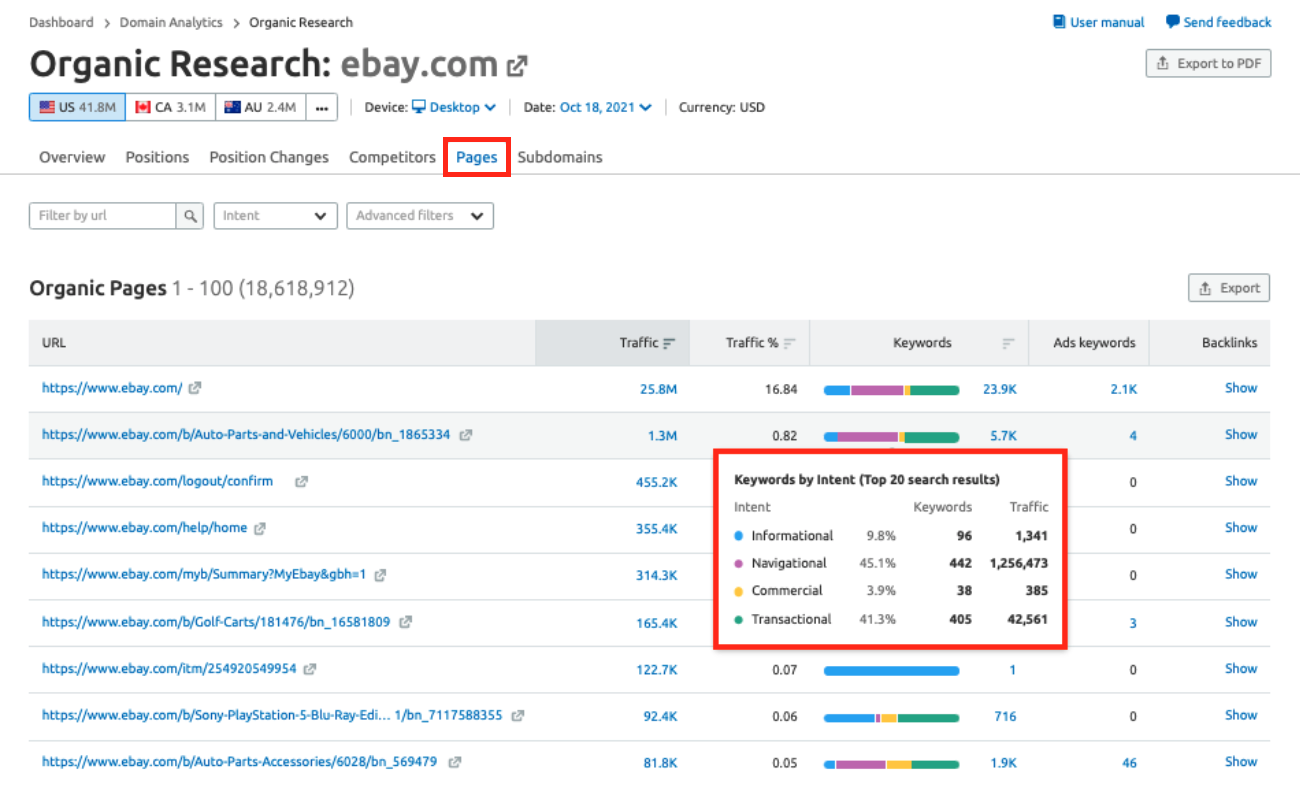
Do you see mostly navigational, informational, or transactional keywords bringing traffic to their most valuable pages?
Use this research as inspiration for your own content strategy.
3. Find high intent keywords with the Keyword Magic Tool
Just enter a seed keyword related to your site and then apply the Intent filter.
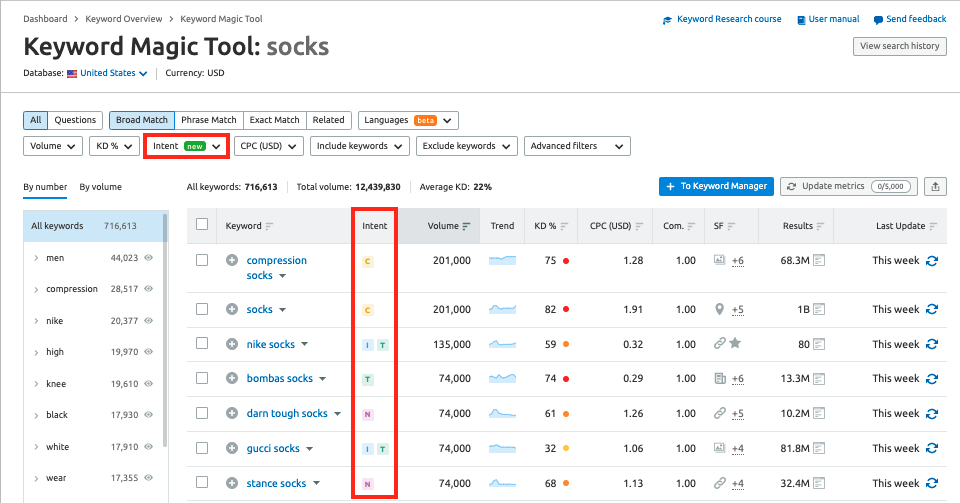
Boom — now you can see searches related to your main target query that are transactional, commercial, informational, and navigational.
Transactional and commercial keywords are going to have the highest intent, so these would make better targets for paid advertising or pages where your visitors can directly buy or take action on your site.
To see only these keywords, apply the relevant Intent filter to your table.
For more ways to use keyword intent in your marketing, read Analyzing Search Intent with Semrush
Ending Thoughts
Knowing the different types of keywords and identifying their intent is an important part of creating your keyword strategy.
By performing keyword research for all stages of the buying funnel, you’ll be able to provide answers to questions users may have and drive them toward a purchase.
Innovative SEO services
SEO is a patience game; no secret there. We`ll work with you to develop a Search strategy focused on producing increased traffic rankings in as early as 3-months.
A proven Allinclusive. SEO services for measuring, executing, and optimizing for Search Engine success. We say what we do and do what we say.
Our company as Semrush Agency Partner has designed a search engine optimization service that is both ethical and result-driven. We use the latest tools, strategies, and trends to help you move up in the search engines for the right keywords to get noticed by the right audience.
Today, you can schedule a Discovery call with us about your company needs.
Source:





![How to Find Low-Competition Keywords with Semrush [Super Easy]](https://allinclusive.agency/uploads/images/how-to-find-low-competition-keywords-with-semrush-super-easy.svg)